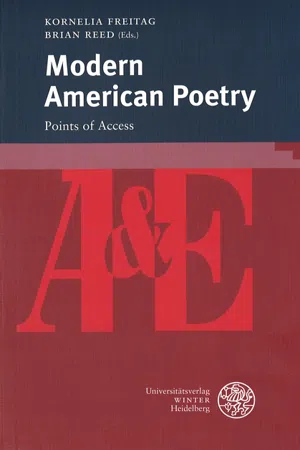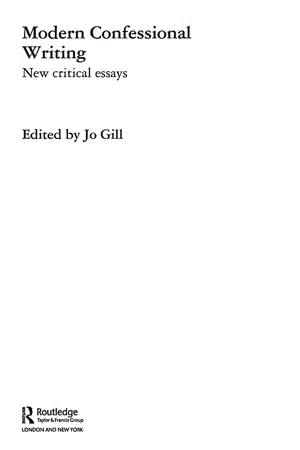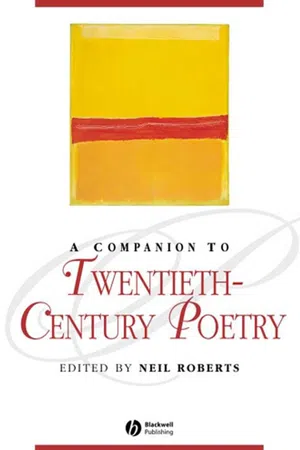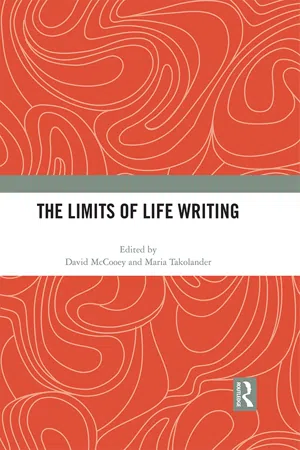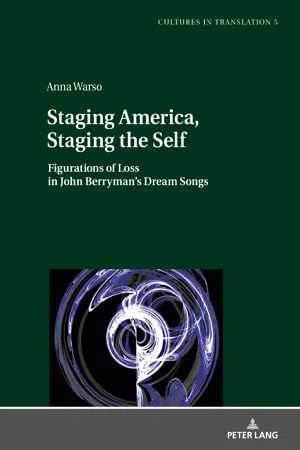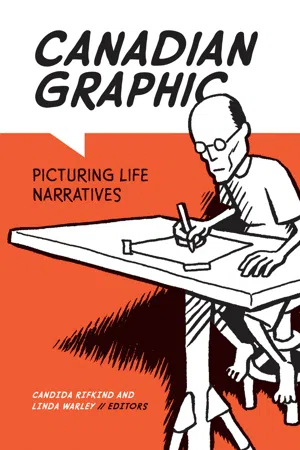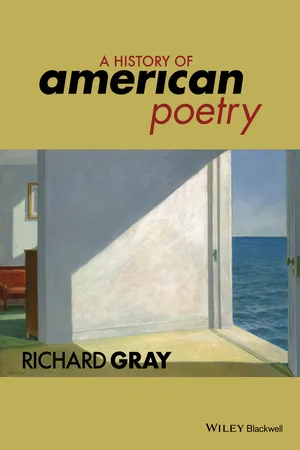Literature
Confessional Poets
Confessional poets are a group of mid-20th century poets known for their autobiographical and deeply personal writing style. They often explored themes of mental illness, trauma, and personal struggles in their work, blurring the lines between the self and the art. Notable confessional poets include Sylvia Plath, Anne Sexton, and Robert Lowell.
Written by Perlego with AI-assistance
Related key terms
1 of 5
8 Key excerpts on "Confessional Poets"
- No longer available |Learn more
Modern American Poetry
Points of Access
- Kornelia Freitag, Brian Reed(Authors)
- 2013(Publication Date)
- Universitätsverlag Winter(Publisher)
The Confessional Poets occupy a curious place in the history of twentieth-century American poetry. While their verse might not fit perfectly the definitions of postmodernism offered by theorists such 99 100 as David Harvey, Fredric Jameson, and François Lyotard, it none-theless clearly positions itself as coming after, and even super-seding, literary modernism. More specifically, in their best-known and most representative lyrics the Confessional Poets tend to reject the impersonal elevated style characteristic of Anglo-American modernism. In contrast to the obscurity and erudition of High Modernist poetry, Rita Horváth explains, Confessional poems seek immediate apprehension […]. The syntax of Confessional poems is rarely convoluted; their patterns of allusion are not excessively cryptic; the poems tend to be less condensed and more repetitive than High Modernist poems (13). The Confessional Poets are also understood as introducing a mode of composition that has had widespread impact on subsequent generations of American writers. Literary critics in fact frequently use the word confessional somewhat loosely to refer to any con-temporary verse that stylistically or thematically recalls such volumes as Lowell's Life Studies , Berryman's Dream Songs (1969), Plath's Ariel (1965), Sexton's Live or Die (1966), and W.D. Snodgrass's Heart's Needle (1959). In this expanded sense, confessional often possesses negative connotations that echo Rosenthal's review. That is, the term can imply the desire to make self-indulgent, lurid revelations instead of attending to matters of craft. Marjorie Perloff's Differentials (2004), for example, takes great pains to show that poets can write well about autobiographical subjects without making talk-show-like histrionic confessions to prove their authenticity (133). - eBook - ePub
Modern Confessional Writing
New Critical Essays
- Jo Gill(Author)
- 2006(Publication Date)
- Routledge(Publisher)
Life Studies in 1959, its definition and its usefulness have been much debated. Nevertheless the name has stuck, because it seems to capture something important about the poetry. To begin with a brief definition: confessional poetry draws on the poet’s autobiography and is usually set in the first person. It makes a claim to forego personae and to represent an account of the poet’s own feelings and circumstances, often by reference to names and scenarios linked to the poet. The work dwells on experiences generally prohibited expression by social convention: mental illness, intra-familial conflicts and resentments, childhood traumas, sexual transgressions and intimate feelings about one’s body are its frequent concerns. The transgression involved in naming the forbidden gives rise to the term ‘confession’, which, via its religious, psychoanalytic and legal associations, summons up ideas of sin, mental breakdown and criminality.The shock value inherent in such links plays an important part in the operation of this poetry, but defenders of the work have objected that the term focuses attention on these elements and obscures the poets’ artistry and more subtle effects. Objections have also been made to the term’s suggestion of an identity between poet and speaker – its perceived implication that the poet ‘confesses’ in the poems as s/he might to a priest or doctor. Clearly, though based on elements of the poet’s life, such work cannot be restricted to literal retellings of events or ‘true’ emotions. As recent studies in autobiography confirm, some transformation must occur in the process of rendering any set of facts into narrative, poetic or not. Indeed, confession’s reality claim is an extremely artful manipulation of the materials of poetry, not a departure from them. But it has confused some readers, who endorse the claim for a special confessional ‘truth’. - eBook - PDF
- Neil Roberts(Author)
- 2008(Publication Date)
- Wiley-Blackwell(Publisher)
Confessionalism has no leader, no manifesto, and in spite of representing an extreme development in modern poetry, it is often difficult to pin-point exactly. It is detected with most accuracy only in a stage of a poet’s career, perhaps even in an individual poem or sequence, and because of this its role in the transition of creativity from one stage to another may be a key one. The critic M. L. Rosenthal was the first to explore at length the implications and achieve-ments of the Confessional Poets and the scope of this essay is somewhat determined by the limits of that study. The poets providing the focus here are those which Rosenthal places centrally, but there are other figures, among them Randall Jarrell and Delmore Schwartz, whose work at times exhibits key characteristics of confes-sionalism and whose connection to its major figures makes them especially signifi-cant. I will concern myself primarily with work written in the 1950s and consider both its collective impact on the progress of modern poetry and its significance in the development of individual poets. Steven Gould Axelrod cites three essential elements of confessional poetry: ‘an undisguised exposure of painful personal event . . . a dialectic of private matter with public matter . . . and an intimate, unornamented style’ (Axelrod, 1979, p. 98). In a critical climate which often appears to privilege the first of these definitions at the expense of the others, it is important to consider the relationship between personal and cultural upheaval as well as the formal implications of such poetic change. The expression of personal pain has been regarded as a hallmark of confessional poetry. All its chief proponents suffered from severe personal difficulties: destructive family relationships; traumatic childhoods; broken marriages; recurring mental breakdowns; alcoholism or drug abuse. - eBook - ePub
- David McCooey, Maria Takolander(Authors)
- 2019(Publication Date)
- Routledge(Publisher)
They also comply with the cultural expectations of confession (religious and psychoanalytic) in conveying intimacy and, by offering their private selves for public consumption, conscientiously embrace the frisson of transgression. Nevertheless, confessional poems, as Lerner puts it, have ‘an aesthetic reason’ for being written (66). They are composed from a rich, institutionally acquired knowledge of the domain, and often in direct response to the work of fellow poets in the confessional school. 7 The poetry is also motivated by professional ambition for success and recognition from the gatekeepers in their domain – for publication and acclaim, and even monetary reward. As Hughes poetically confesses of his and Plath’s use of life in their work as young poets, ‘we still weren’t sure we wanted to own / Anything. Mainly we were hungry / To convert everything to profit’ (1125). 8 Such points are all germane to a theory of creativity that shifts the emphasis from individual psychology to what Glăveneau calls ‘cultural psychology’ (Distributed Creativity 8) – from a ‘He-paradigm’ or masculine ‘paradigm of … the exceptional creator’ (7) to a ‘We-paradigm’ (8), which understands creativity as a ‘ distributed, dynamic, socio-cultural and developmental phenomenon ’ (2, original emphasis). However, what I want to bring into focus here is how every creative act is also shaped by its materials, drawing attention to how the self that materialises through the autobiographical artefact is always other than itself. In what follows, I examine how confessional poetry emerges as a result of the writer making ‘a more or less conscious decision to share agency with the object and follow its lead at different moments within the process’ (Glăveneau Distributed Creativity 60, original emphasis) - eBook - PDF
Staging America, Staging the Self
Figurations of Loss in John Berryman's Dream Songs
- Anna Warso, Agnieszka Pantuchowicz(Authors)
- 2022(Publication Date)
- Peter Lang Group(Publisher)
poets themselves have had to resort to unnecessarily elab- orate defenses, when in point of fact, none of the major confessionals – Lowell, Berryman, Roethke, Ginsberg, Snodgrass, Sexton, Plath, and the originator of the mode, Delmore Schwartz – are solely “confessional” in the limited and generally pejorative sense that has gained such a wide currency� (“Impersonal Personalism” 687) Popularized by M�L� Rosenthal, who coined the term in 1959 in his early review of Robert Lowell’s Life Studies, adjective “confessional” in combi- nation with nouns such as “school” or “poetry” has indeed continued to cause confusion� It may have partly been caused by the critic’s references to Lowell’s “uncompromising honesty” in exposing what may be assumed to be some kind of an authentic and essential self� Rosenthal famously - eBook - PDF
- Eleanor Spencer-Regan(Author)
- 2017(Publication Date)
- Red Globe Press(Publisher)
Part II Form and Genre 151 8 The Great Divide? Post-confessional and Language Poetry Paul Batchelor ‘Not a group but a tendency ’ 1 is how Ron Silliman announced, in 1975, what has since come to be known as Language poetry. Similarly, we should see confessional poetry as a tendency, rather than as a group or movement. The term ‘confessional poetry’ was coined by M. L. Rosenthal in a review in 1959: the poets most directly associated with the tendency – Robert Lowell, John Berryman, Sylvia Plath, and Anne Sexton, with W. S. Snodgrass and Stanley Kunitz in supporting roles – did not consider themselves a group, and produced no mani-festo. As only some of their work can be called confessional, it is mis-leading to refer to them as the ‘Confessional Poets’. Furthermore, the confessional tendency was only one of several post-war reactions to the supposedly ‘impersonal’ poetics of Eliot and Pound, which seemed discredited after having proved compatible with fascist sympathies and anti-Semitism. Other avowedly ‘personal’ poetic movements included Projectivism, with its emphasis on the poet’s breath; Frank O’Hara’s ‘I-do-this-I-do-that’ poems and mock-manifesto ‘Personism’; poetries of witness that asserted the political identity of the poet; and Beat poetry. Readers familiar with such movements may find it difficult to appreciate the extent to which confessional poetry represented, to many of its initial readers, a radical, decisive break with the high modernist tradition. Today it is more likely to appear timely, or else of its time, in the way it embodies the paradoxes that characterized the Cold War period in the US. The paranoia and insularity that accom-panied the country’s emergence as the dominant economic global force find a corollary in confessionalism’s swaggering vulnerability and theatrical narcissism. If ‘confessional poetry’ is a problematic label, ‘post-confessional poetry’ risks adding a further layer of vagueness, as it must be defined - eBook - PDF
Canadian Graphic
Picturing Life Narratives
- Candida Rifkind, Linda Warley, Candida Rifkind, Linda Warley(Authors)
- 2016(Publication Date)
- Wilfrid Laurier University Press(Publisher)
( 24 ) CON FESSION A N D T HE R EL ATIONA L SELF life narratives I study position the reader in the imagined role of an inti-mate confidant. They create interactive accounts of the past that align with the desires for dependency and appeasement that exist along the continuum of affective exchange. I Confession’s Troubling Transparency I FOCUS ON the concept of confession in a literary context, but it bears mentioning at the outset that it is widespread in its appearances. It sur-faces in a variety of different scenarios: “The confessional mode has been associated with ecclesiastical, judicial, medical and psychological dis-courses, as well as with literature” (Radstone 27). For example, the con-cept of confession serves a specific role in a psychological context, which shares some similarities with its role in a medical context, but it would be a mistake to conflate these two situations because each has such separate aims and goals. A clear way of understanding confession, in the broadest terms, is to treat it as a set of cultural discourses operating in a wide vari-ety of different scenarios. In a literary context, confessional writing may be understood as a collection of distinctive genres that makes extensive use of confessional discourses. In his survey of the Canadian novel, David Williams suggests that certain Canadian authors draw inspiration from confessional discourses because they want to transfer into their fictions the textures of everyday life (8). Williams avoids describing confession as an act that records an author’s observations with perfect accuracy. A confession is at once an act of revela-tion and an act of obfuscation (32, 83–84). As Jo Gill convincingly argues in her introduction to Modern Confessional Writing , confession is not a means of expressing the irrepressible truth of prior lived experience, but a ritualized technique for producing truth. Confessional writing is poietic not mimetic.thinspace.thinspace.thinspace. - eBook - ePub
- Richard Gray(Author)
- 2015(Publication Date)
- Wiley-Blackwell(Publisher)
This is not so much confessional poetry, in fact, as pure confession: moving, sometimes, in the way that the confidences of any stranger might be, but not something in which we can begin to share. The Confessional “I” as Prophet “I’ve been very excited by what is the new breakthrough that came with, say, Robert Lowell’s Life Studies,” said Sylvia Plath. “This intense breakthrough into very serious, very personal emotional experience, which I feel has been partly taboo.” “Peculiar and private taboo subjects I feel have been explored in recent American poetry,” she went on, “– I think particularly of the poetess Anne Sexton … her poems are wonderfully craftsmanlike … and yet they have a kind of emotional and psychological depth which I think is something perhaps quite new and exciting.” Plath’s excitement grew, of course, from a sense of kinship. Even her earlier poems are marked by extremism of feeling and melodic cunning of expression, as these lines from “Lorelei” indicate: O river, I see drifting Deep in your flux of silver Those great goddesses of peace. Stone, stone, ferry me down there. 72 The compulsion to go inward and downward – to immerse oneself in “the great depths,” perhaps of death – is powerfully articulated here; and it is rendered at once piercing and mournful by the verbal pattern of thin “i” (“drifting,” “in,” “silver”) and tolling “o” (“O,” “Stone, stone,” “down”) sounds. But it was in the poems published after Plath’s suicide, in Ariel, that the impulse towards oblivion, and the pain that generated that impulse, were rendered in inimitably brutal ways: in terms, at once daring and deliberate, that compel the reader to participate in the poet’s despair. The suffering at the heart of her work has received ample attention; however, the craft that draws us into that suffering is sometimes ignored. Fortunately, Plath did not ignore it
Index pages curate the most relevant extracts from our library of academic textbooks. They’ve been created using an in-house natural language model (NLM), each adding context and meaning to key research topics.
